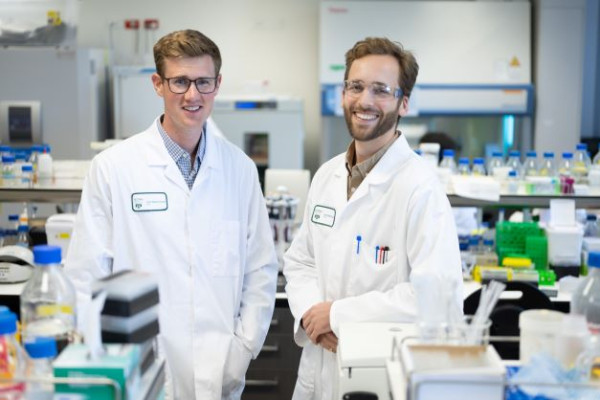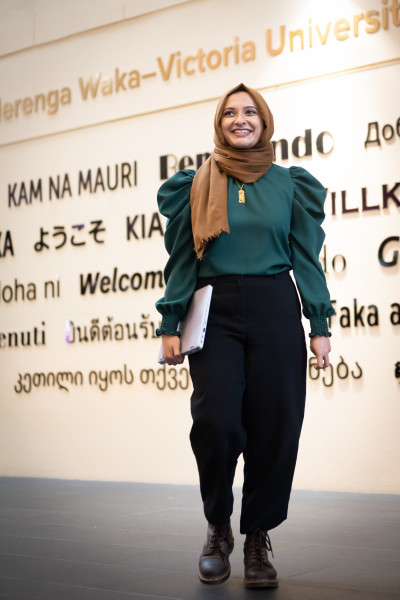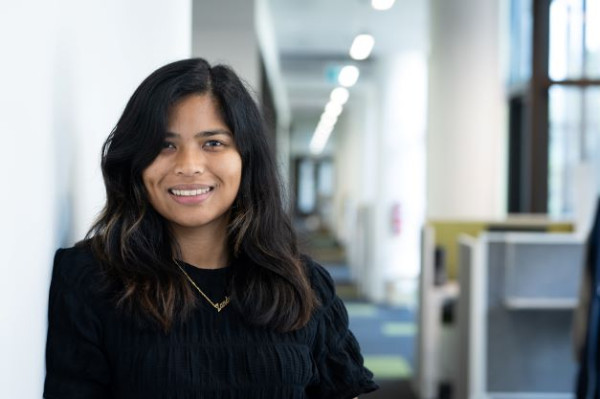Published Feb 7, 2023
Wellington UniVentures is currently supporting four Te Herenga Waka—Victoria University of Wellington researchers through KiwiNet’s Emerging Innovator (EI) Programme. The programme equips New Zealand’s early career scientists with the entrepreneurial skills required to launch a successful business based on their research.
From insecticides to winemaking and support for refugees, their projects span different sectors, but one thing these young innovators have in common is a commitment to creating real world impact through their research.

Alistair Richardson and Luke Stevenson
“Working in the lab can feel intellectually quite exciting but it’s great to be able to look at the bigger picture. When I talk to my friends and family about what I do, the most interesting things are those that could go out into the world as a product that people can use and understand,” says Luke.
His lab mate and fellow Emerging Innovator, scientist Alistair Richardson, agrees: “A lot of the time in academia you are expanding knowledge that may, eventually, be used somewhere down the track. I prefer to work on projects where the reason why we’re doing it, and how it can be beneficial, is obvious.”
A clear research outcome is exactly what Emily’s lab offers. The lab has been working on a commercialisation strategy for their natural insecticide with Wellington UniVentures’ Senior Commercialisation Manager Matt Nicholson. Now – with a clear path to market established – Matt encouraged Luke and Alistair to undertake the EI programme in preparation for spin-out.
Both scientists are interested in entrepreneurship as a potential career path and are eager to learn more through the programme.
“It will be my first exposure to this type of thing, and I hope that whatever I learn will make me a better scientist as well as a better entrepreneur,” says Luke.
Alistair adds, “We’ve always had Matt taking care of the commercial side of things, so through this programme we’ll be much more aware of what he’s doing for us and how we can best support him.”

Nuzha Saleem
PhD candidate and Emerging Innovator Nuzha Saleem is developing a resource to help Aotearoa New Zealand’s young refugees make friends. “All the research shows how important friends are to young people’s sense of belonging, which in turn leads to positive outcomes in other areas like education,” says Nuzha.
Nuzha was inspired to dedicate her PhD to improving educational outcomes for young refugees after she volunteered with a group of Syrian newcomers. “A lot of research I was reading at that time about refugees had to do with trauma, but the people I met were smiling, smart, ambitious, and eager to embrace Aotearoa as their home. I wanted my research to reflect what I had seen, without contributing to the victim narrative,” Nuzha says.
Nuzha has always had a relentless drive to find real-world applications for her research, and is a strong advocate for community-based research being fed back to the community. So when Wellington UniVentures suggested she attend the EI Programme, Nuzha was intrigued by the prospect of learning how to get her resource out of academia and into the hands of those who need it most.
Nuzha hopes the programme will expose her to new business models that will allow her to grow the resource in a sustainable way that doesn’t pass the cost on to the end user. “I’m excited to learn how to use commercialisation as a tool for creating social impact,” she adds.

Lee Tejada
Postdoctoral Fellow Lee Tejada plans to start a new company based on her PhD research, with support from Wellington UniVentures, and hopes the programme will give her practical skills for her entrepreneurial journey.
Through her PhD in Associate Professor Wayne Patrick’s lab, Lee created a quick and simple test to measure the amount of nitrogen in grapes. Getting the level of nitrogen wrong can ruin an entire batch of a wine, so winemakers traditionally spend hundreds of dollars having their grapes tested in sophisticated laboratories to avoid mistakes. Lee’s product has the potential to replace this time-consuming process, allowing winemakers to run the test themselves, right on the spot.
She’s been working with Wellington UniVentures to spin-out a new biotech company. “We now have a clear market and a prototype product to sell, so it’s the best time to do the programme because I’ll be able to directly apply what I’m learning to the new venture,” says Lee.
Lee hopes her new company will give Aotearoa New Zealand scientists an exciting place to work. “I want to create a biotech company that not only solves interesting problems but gives researchers like me a place to do cutting edge science, without having to leave the country,” she adds.
